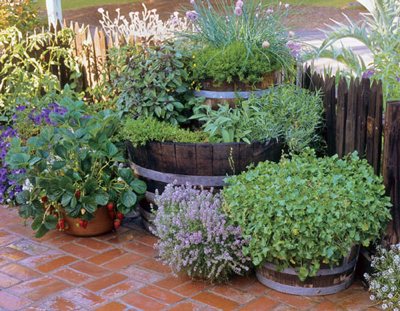Culinary Herbs for Home Growing
 Most herbs are easy and rewarding plants to maintain and grow. They can grow either indoors or outdoors as part of your garden, provided that the weather is not too cold or frosty. You can use any multi purpose compost to grow herbs successfuly, making them an ideal beginners plant for new gardeners. You can buy compost online for great prices from many compost suppliers like us if you want to expand your herb garden.
Most herbs are easy and rewarding plants to maintain and grow. They can grow either indoors or outdoors as part of your garden, provided that the weather is not too cold or frosty. You can use any multi purpose compost to grow herbs successfuly, making them an ideal beginners plant for new gardeners. You can buy compost online for great prices from many compost suppliers like us if you want to expand your herb garden.
Possibly the biggest advantage of growing your own herbs, is that by using freshly pruned leaves you maintain a lot more of the taste than store bought, giving you a better product at a fraction of the cost. Here is a short guide on a few easy herbs that can be used in your cooking:
Ginger
Ginger is a widely used plant known for its spicy fragrance and unique health properties. It’s also very simple to cultivate. All you need to do is buy a chunk of ginger and cover it in soil in a container. Keep the soil moist, water when dry. To harvest pull the entire plant, simply cut off what you need and then re-plant. The taste of the ginger depends on its harvest. The older plant has a hot taste, whereas a young plant is more mild and succulent.
Basil
Basil is normally associated with Italian cooking, being a main ingredient in pesto, and used to garnish many Italian dishes. To grow plant the seeds in soil or organic compost and place in a small container about 4 inches deep with drainage holes. Then all you have to do is water once a day or when the soil is dry, and fertilise the compost about once a month.
Prune the leaves when they reach 6 inches in height. To harvest, cut a few leaves from the plant, use as soon as possible. Use at the last stage of cooking to maintain freshness.
Coriander
Freshly pruned coriander leaves can give a refreshing kick to Indian, Mexican, Thai and any other foods that involve strong and bold spices. To grow, plant the seeds in a container about 8 inches deep with holes in the bottom, and fill with soil leaving around an inch or so of space.
Plant the seeds in the top of the soil and water and then cover with cling film. After a few days, remove the cling film when the seeds germinate. When the plant grows out with full green leaves, prune when you need them but take care not to remove all the leaves from one plant. As with Basil, use Coriander at the last stage of cooking as a garnish, to preserve freshness.
Growing Conditions and Compost Choice
Herbs are fairly versatile, but due to their tropical origins most herbs will not do too well outdoors during the colder months. The advantage of their small size means that you can grow them indoors without too much space being taken up. They can even fit on a small windowsill. A location which is warm with lots of natural light is ideal to get healthy plants.
Try experimenting with different kinds of compost for your herbs as well as mutli purpose compost. A mushroom or other organic compost may provide a better grow and tasteir herbs. You can buy compost online at a relatively cheap rate.
If you keep them in the right conditions, with regular watering and pruning, your herbs will have a great yield of leaves, and make a great sustainable addition to your kitchen.